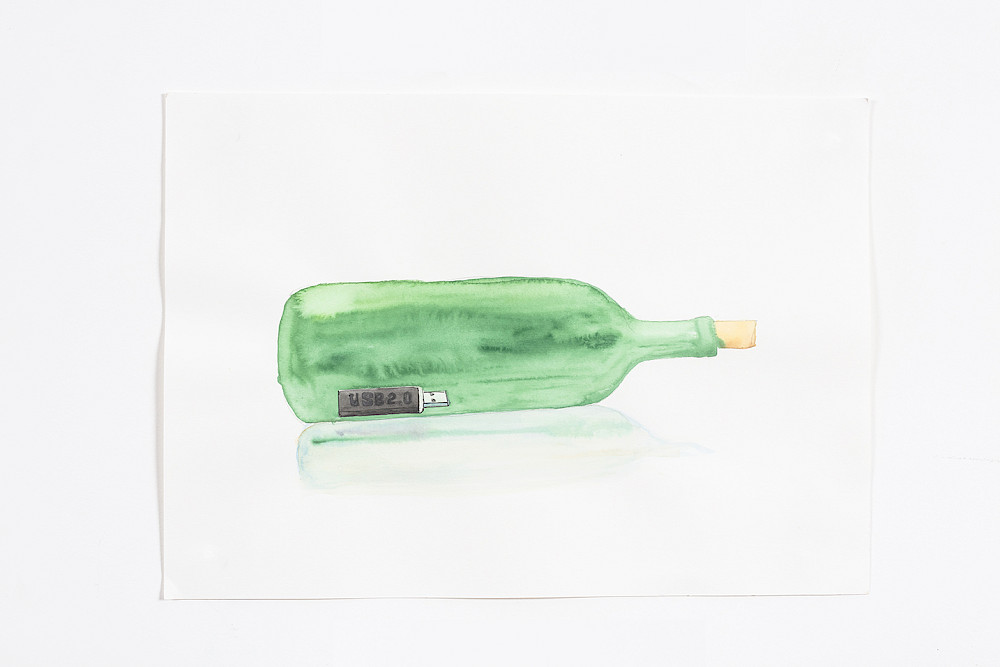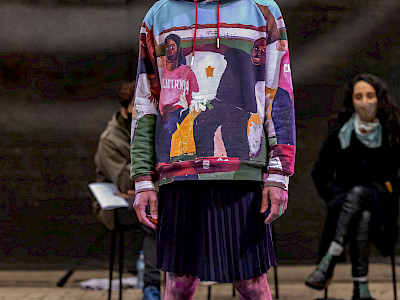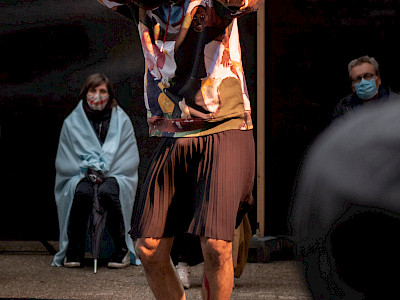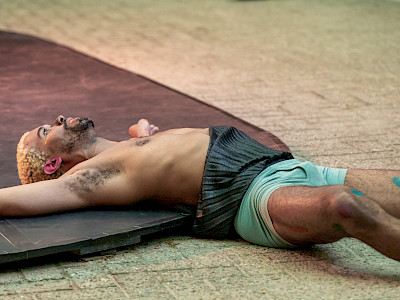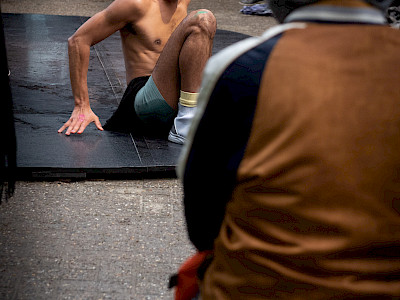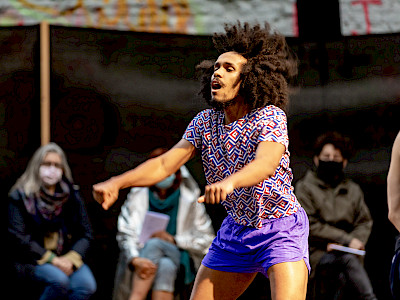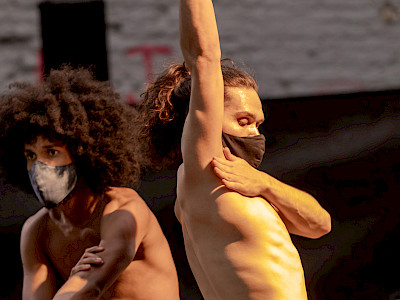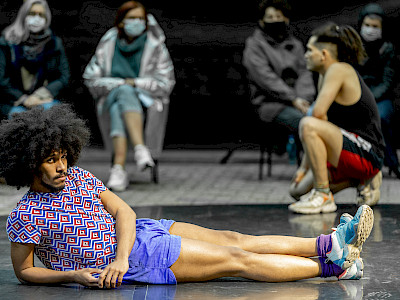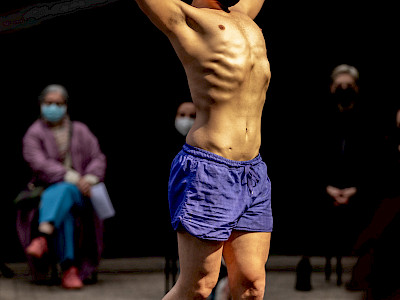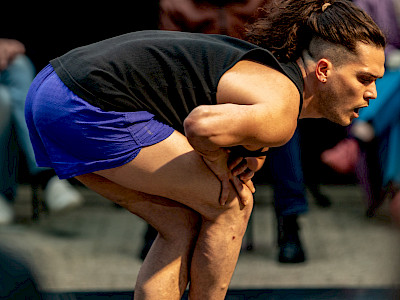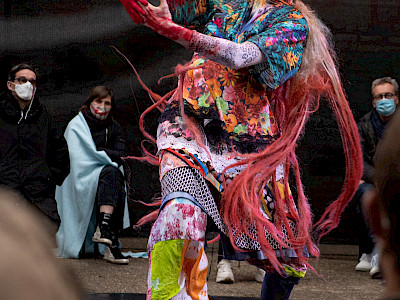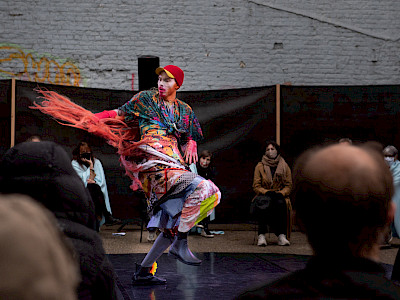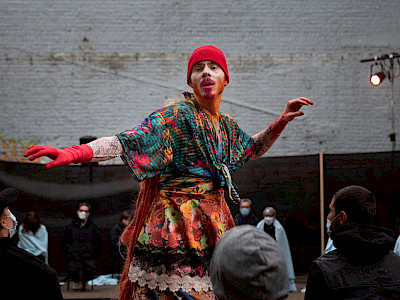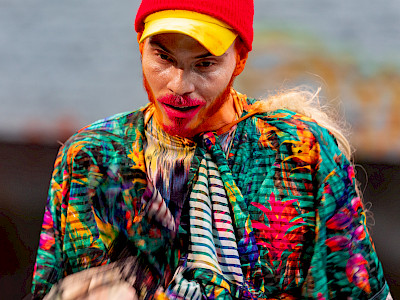20 — 24.05.2021
Outrar means becoming the other, being contaminated by the other in a practice of continuous exchange. After her successful choreographic masterpiece Fúria – an explosive performance that caused a stir on the main stage of the Théâtre National at the Kunstenfestivaldesarts in 2019 – Lia Rodrigues returns to share a work, constructed collectively with her company in Brazil and imagined during these last month of health crisis caused by Covid-19. Faced with the impossibility of travelling – and the necessity to be in Brazil – she worked online together with the artists from her dance company and with musicians from different backgrounds to create a new project for the festival, a dispositive in which the choreography travels from continent to continent, and from body to body. Outrar is a series of choreographic inputs and a sonic letter sent from Brazil to Brazilian who are based in Europe today: a powerful journey at the threshold between distance and proximity.
Outrar
Interview with Lia Rodrigues
After presenting Fúria in 2019, you return to the Kunstenfestivaldesarts in 2021 with Outrar. Derived from the noun ‘outro’, which means ‘other’ in Portuguese, this verb can be translated as ‘to make oneself different’. Fernando Pessoa, a writer known for his numerous heteronyms and fictional alter-egos, conceived this neologism to evoke a state of openness, solidarity and empathy, a capacity to imagine oneself in the place of another, as well as a recognition of the opinion and perspective of another. Considering your work on marginalized corporealities and subjectivities, how do you conceive the movement of “making oneself other”? How does this impulse towards the other manifest itself in your choreographic work?
“To be as close as possible is not to touch, the greatest proximity is to assume the distance of the other”. This is a beautiful quote from Jean Oury [a French psychoanalyst and psychiatrist] in connection with the verb “outrar” invented by Pessoa. I’ve used this concept as a guideline for a very long time in my workshops and courses. It’s about looking at the other, transmuting and transfiguring oneself. In this sense, I also like the idea of transcreation, another neologism, this time by Augusto de Campos. I understand transcreation as the act of anthropophagy of the other, but not with a view to annihilating him or her but rather to approaching his or her qualities. Thus, rather than literally becoming another, “outrar” is a radical listening to the other, and a possibility of finding something common in difference.
This radical listening began as a curiosity, a desire, but I soon realized that it was a civic duty, a responsibility in a country marked by racism and structural inequalities. As a choreographer, and from my position as a white middle-class person in Brazil, I consider it a duty to create links and spaces of encounter with the other.
This radical listening to the other runs through your practice on several levels. It is central to your working methodology and your pedagogy. The explicit references to indigenous cosmovisions in the trilogy Pororoca (2009), Piracema (2011), Pindorama (2013) and Para que o céu não caia (2016) are also symptomatic of this openness to otherness. Finally, you follow this commitment on a daily basis in Maré, one of the largest favelas in Rio de Janeiro, where you based your company in 2004, and where you created, within the framework of the NGO Redes da Maré, the Maré Arts Centre with Silvia Soter and Eliana Sousa Silva in 2009, as well as its Free School of Dance. Why do you emphasize this impulse towards the other, an inclination that is omnipresent in your practice, precisely at this moment?
First and foremost, Outrar is linked to the health crisis we’re going through, and the flagrant inequalities it has exacerbated. Which bodies are dying the most? On the day we’re conducting this interview, 25 people were murdered in Jacarézinho, the favela next to Maré. An act of barbarism under a management aligned with that of Bolsonaro. 25 people, not 25 criminals. This is an urgent subject of reflection that cannot be ignored.
The idea for the conception of this work arose practically during a residency at the Pianofabriek in December 2020, at the invitation of the directors of the Kunstenfestivaldesarts, Daniel Blanga Gubbay and Dries Douibi. I spent a week alone in a dance studio, whereas I usually work in a collective, in a relationship with each other. With my company, we work in collaboration: they dance and I weave, braid and interweave the choreographic framework. This time, I did the opposite. I danced alone in Brussels and was sent instructions from a distance via Zoom. That’s when I realized that this collective solo opened up possibilities.
“Collective Solo” is a good synthesis of the condition of virtual sociability that we’re experiencing during this pandemic. Beyond these technological tools that allow us to be together at a distance, what were the dynamics of exchange and transmission that you established during the Outrar process?
Based on the conversations with Daniel and Dries, we thought of a project that could put several people in contact. I got together with all the artists in my company and we came up with the format of a collective letter. Each artist proposed fragments of instructions. The letter is the sum of their contributions, with a total of 27 tasks: being a peacock, being a gorilla, the coffee break, manipulating an object, trembling, bird’s wings, constellating, becoming turbulent, appearing and disappearing, etc.
I followed more or less the same principle for the music. I called up musicians I know, who were close to me, and asked them to send me sound extracts. I compiled extracts of music that Zeca Assumpção had created for me a long time ago, recordings of the Dutch singer Henk Zwart who lived upstairs from me, which I then sent to Zeca in São Paulo, of the electro-acoustic group ‘Cadeira’ of which my daughter Inês Assumpção is a member, of the Dutch DJ Mendel, and also of sounds created by the dancers. Musician Alexandre Seabra helped me edit and mix the soundtrack. It wasn’t only a long-distance encounter but also an intergenerational one: from Zeca Assumpcão who is 76 years old to the young people who are receiving their first paycheck.
This framework of music fragments and instructions make up this sound letter to Brazilian artists who are in Europe: Luyd Carvalho, Marllon Araújo, Volmir Cordeiro, Calixto Neto. The artists are totally free to do what they want with this gift letter, the only rule is to use this sound-track, which is the same for all.
Considering this period of scarcity and crisis, we thought of making a project where everyone could receive the same pay. Outrar is a form of mutual aid and starts from a desire to distribute resources and opportunities. I always think that my work should be supportive. I want artists to survive, I want young people to be enthusiastic about continuing their work. Perhaps creation can give courage to face this difficult moment? In any case, at a time when Brazil has a record number of deaths and the state has murdered 25 people, I think that to create is to make a pact with life.
Consolidating an affective framework and consciously activating a support network is just one example of how ethics and aesthetics come together in your practice. In an increasingly fragile cultural milieu in Brazil, do you see your commitment to the collective and your artistic work as a form of resistance?
I’m rather reticent about using the word resistance to talk about artists. I think that the first resistance is not made by the artists, but by the bodies that are considered peripheral. They say yes to life every day. In my opinion, this word is relative to other resistances. It’s with these bodies considered peripheral that I learn to resist. I prefer to talk about the ecology of doing, which is still different from an ecological attitude that in Europe is associated with, for example, not travelling by plane. While recognising the seriousness of the environmental situation, I understand ecology in a broader sense.
Firstly, we have to listen to those who have been talking about ecology for more than 500 years, the indigenous peoples, and then the quilombolas [self-organised communities of Afro-Brazilian origin]. Their wisdom is almost systematically ignored. Generally speaking, it seems to me that Europe is still rather reticent when it comes to non-Western knowledge, and still adopts a very male and white perspective. So we need to de-focus, to widen the centre, and to make this space accessible to other world views, to become literate in other literatures.
My ecological attitude consists in working continuously with the territory. This is what led me to become involved with Redes da Maré, an NGO formed by the inhabitants of this favela. I went there in 2003 for the first time, and it was then a place that few contemporary artists visited. The Maré Arts Centre was born out of a meeting with Eliana Sousa Silva, director of Redes da Maré, and Silvia Soter, a playwright and professor at the Faculty of Education of
the Federal University of Rio de Janeiro. It is part of a larger, multi-purpose complex: it is a space for dance, the arts, seminars, and meetings of the favela’s residents. There, art is not separated from life, it is next to life. I am convinced that we need other purposes, other meanings for art to have meaning. So Outrar is part of my way of looking at life. It’s not just a choreography, it’s about creating a way of being in the world, compromising with the creation of spaces where differences can meet.
- Interview conducted on 7 May 2021, edited and translated from Portuguese by Olivia Ardui.
Presentation : Kunstenfestivaldesarts-De Kriekelaar
Direction, creation : Lia Rodrigues | With: Marllon Araújo, Luyd Carvalho, Volmir Codeiro, Calixto Neto | Creation: Amalia Lima, Leonardo Nunes, Carolina Repetto, Valentina Fittipaldi, Andrey Silva, Larissa Lima, Ricardo Xavier | Original soundtrack created and performed by: Zeca Assumpção, Henk Zwart, Mendel , Grupo Cadeira (Inês Assumpção, Jorge Potyguara, Miguel Bevilacqua, Henrique Rabello) and parts of the CD 'Authentic South America 5 , The Amazon' | Editing and mixing: Alexandre Seabra | Commissioned and produced by Kunstenfestivaldesarts | Supported by: Kunstenwerkplaats
